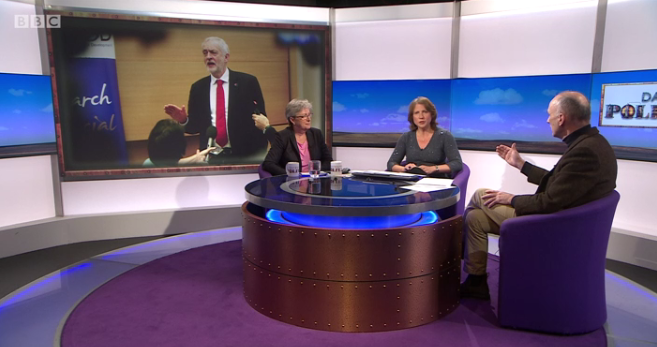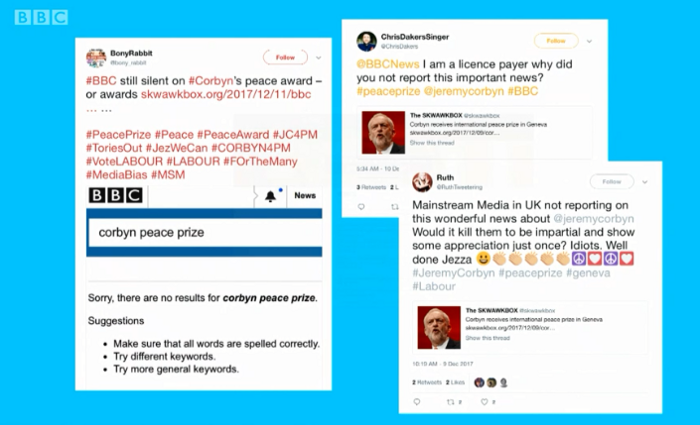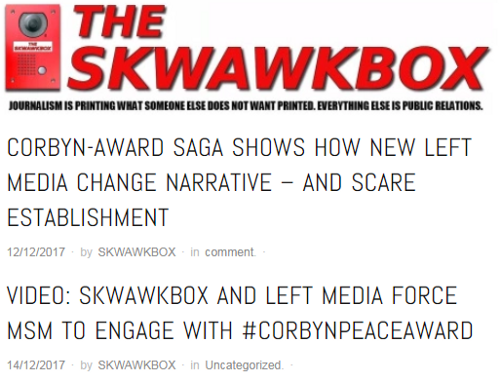Corbyn and the peace prize: Skwawkbox embarrasses the Left again

Labour MP Chris Williamson made an appearance on the Daily Politics show yesterday to vigorously defend the view that there has been a politically-motivated “media blackout” over Jeremy Corbyn receiving the Sean MacBride Peace Prize. The award was presented to the Labour leader when he was in Geneva last week to address the UN, but the event met with what some of his supporters claim has been a conspiracy of silence by the hated MSM.
This tale of shocking anti-Corbyn media bias was promoted by the alt-left “news” site Skwawkbox, which is a one man band run by a Labour Party member from Liverpool named Steve Walker. I’ve had some harsh words to say about Skwawkbox in the past, criticising Walker’s method as “hyping up stories in order to generate clickbait headlines, with little or no concern for accuracy, often combining this with unsubstantiated claims that the authorities are involved in some sort of conspiracy”. I did think Walker had taken account of such criticisms, because he appeared to have made an effort to tone down the hysterical character of his posts and adopt a more sober approach. Unfortunately he has now fallen off the wagon again.
According to Skwawkbox’s overheated imagination, the media have been guilty of wilfully ignoring the important news that Corbyn had received a “major international award”. To be fair, Skwawkbox’s original post (“Corbyn receives international peace prize in Geneva”) was quite reasonable, simply reporting an event that would be of interest to Skwawkbox’s Corbynista followers, if not to the general public. But two other “new left media” (NLM) sites — Evolve Politics (“Mainstream media silent as Jeremy Corbyn wins International Peace Prize”) and The Canary (“Jeremy Corbyn wins an award for world peace and the silence from the mainstream media is deafening”) — couldn’t restrict themselves to publicising a minor story for their niche audience but immediately spun this as an MSM plot to suppress news favourable to Corbyn. Their shock-horror version of events was also taken up by those champions of politically responsible journalism, RT and Press TV. Skwawkbox then couldn’t resist joining in, by posting an attack on the BBC for remaining “silent on Corbyn’s peace award”.

This provoked a spate of indignant complaints by Corbyn supporters. However, once you put aside the hype and the NLM-inspired outrage, the explanation for the lack of media interest in Corbyn’s award is not difficult to find. It is that the Sean MacBride Peace Prize is not a “major international award” at all. In reality it’s a rather obscure prize that has never attracted any media attention in the UK before, and not much elsewhere for that matter. Channel 4’s FactCheck did a search on Factiva and came up with just two articles from the British press over the past quarter century that contain any reference to the Sean MacBride Peace Prize. I did a search on Nexis and got the same result.
One of those two articles is “Vanunu protesters turned away at jail”, published in the Sunday Times back in December 1994. As the title indicates, the article isn’t about the Sean MacBride Peace Prize as such. It reads:
“Israeli police and prison guards yesterday turned British peace activists away from the maximum-security prison where Mordechai Vanunu, a nuclear technician, is serving an 18-year sentence for revealing the country’s nuclear secrets. The protesters, who included Susannah York, the actress, travelled to the bleak Ashkelon prison in an attempt to hand Vanunu the Sean MacBride peace prize he was awarded in Spain recently. But a duty officer refused to let them enter the prison. He also refused to hand the peace medal to Vanunu. Police threatened to arrest everyone present.”
The only other reference from the British press was in an article published by the Guardian in June 2013 under the title “Irish president: protect media diversity to enhance democracy”. Again, the subject of the article wasn’t the Sean MacBride Peace Prize. It was merely reported as background information that Michael D. Higgins is “a noted human rights campaigner, has written widely about international conflicts, and was the first recipient of the Seán MacBride peace prize in 1992”. This would appear to have been copied from the biography on Higgins’ official website.
It’s also worth noting that the award of the Sean MacBride Peace Prize to Higgins attracted minimal media attention at the time. Nexis has just one contemporary report of this event. It’s from the Irish Times in July 1992 and consists of a single sentence, which reads: “The Labour TD, Mr Michael D. Higgins, has become the first recipient of the Sean MacBride Peace Prize, which is to be awarded annually by the International Peace Bureau (IPB) for outstanding work in the field of international peace and justice.”
In 1998 the then SDLP leader John Hume was also awarded the prize. According to Nexis, Hume’s receipt of this supposedly “major international award” merited just one contemporary press report, consisting of a two-sentence article in the Irish Times. The British press didn’t cover it at all, even though Hume was a leading political figure in Northern Ireland and had recently played a central role in brokering the Good Friday Agreement. Indeed, the prize was given to Hume in recognition of his contribution to the Irish peace process, so the award was based on newsworthy current events. Yet the British press ignored it.
Did this media silence reflect political bias against John Hume? I don’t think so. As in Corbyn’s case it was due to the relative obscurity of the Sean MacBride Peace Prize — also illustrated by the fact that the prize isn’t even included in the list of awards displayed in Hume’s Wikipedia entry.
Shortly afterwards, Hume was awarded the Nobel Peace Prize — jointly with Ulster Unionist Party leader David Trimble — again in recognition of his role in the Northern Ireland peace process. That award did attract media attention. The Daily Mirror for example devoted an enthusiastic editorial to it, under the headline “Fitting prize for two truly noble men — David Trimble and John Hume’s Nobel Peace Prize”. The difference in coverage is not hard to explain. It was due to the fact that the Nobel Peace Prize is a “major international award”, whereas the Sean MacBride Peace Prize isn’t.
When Chelsea Manning was awarded the Sean MacBride Peace Prize in 2013 the event was similarly ignored by the media, despite Manning’s high profile. It was only her subsequent rejection of the prize — on the grounds that she was neither a pacifist nor anti-war — that created some minor interest. Manning sent a statement to the Guardian, who published an online article about it, but the only other outlet to take up the story was the Huffington Post. The news wasn’t considered significant enough to qualify for coverage in any of the print media. Or at least I could find no trace of it on Nexis.
In his response to the inconvenient evidence that the failure to report Corbyn’s award is in line with traditional media apathy towards the Sean MacBride Peace Prize (“Corbyn peace award silence: FactCheck asks wrong question, gets wrong answer”) Steve Walker has argued that this is irrelevant because all it shows is that the prize “may not be a topic of much interest when it’s awarded to someone who is not a subject of interest in the UK news”. However, that obviously doesn’t explain the failure of the British press to report on John Hume receiving the award.
Walker also posed the bizarre question of whether there would be a similar media blackout if Theresa May received the Sean MacBride Peace Prize. He replied: “The answer is, of course, straightforward: it’s unimaginable that it wouldn’t have been a half-hourly item on rolling news stations, as well as all over the print media and in flagship news programmes.” But the award to a warmongering Tory politician of a peace prize that typically goes to anti-establishment figures like Noam Chomsky and Chelsea Manning is something that could only occur in a parallel universe. If such a surreal event took place in this one, I think we can guarantee there would be considerable media interest! Walker’s question lacked any purchase on reality.
 Steve Walker has clearly lost all sense of proportion over this issue. Skwawkbox has published, at the present count, eight (!) articles on the subject of Corbyn and the Sean MacBride Peace Prize (see here, here, here, here, here, here, here and here). According to Walker, who is never averse to advertising his inflated sense of his own significance, the controversy provoked by his unsubstantiated tale of media bias “exemplifies and illustrates the impact and importance now of the ‘new left media’ (NLM) to the UK’s political landscape and narrative”. What it really demonstrates is that when the NLM do stupid things like this it attracts the attention of the anti-Corbyn MSM because it provides them with an opportunity to portray Corbyn’s supporters as paranoid political fantasists.
Steve Walker has clearly lost all sense of proportion over this issue. Skwawkbox has published, at the present count, eight (!) articles on the subject of Corbyn and the Sean MacBride Peace Prize (see here, here, here, here, here, here, here and here). According to Walker, who is never averse to advertising his inflated sense of his own significance, the controversy provoked by his unsubstantiated tale of media bias “exemplifies and illustrates the impact and importance now of the ‘new left media’ (NLM) to the UK’s political landscape and narrative”. What it really demonstrates is that when the NLM do stupid things like this it attracts the attention of the anti-Corbyn MSM because it provides them with an opportunity to portray Corbyn’s supporters as paranoid political fantasists.
There are any number of genuine examples of media bias against Corbyn. The failure to report on Corbyn being presented with the Sean MacBride Peace Prize isn’t one of them. In promoting this story Skwawkbox, together with fellow alt-left sites Evolve Politics and The Canary, is just engaging in a leftwing version of Breitbart-style fake news. It discredits the Left when we endorse this sort of nonsense. As for Chris Williamson, who is an effective media performer and a real asset to the Left, he would be well advised to stop using his abilities in order to defend Skwawkbox’s idiocies, because he only damages his own reputation in the process.
First published on Medium in December 2017